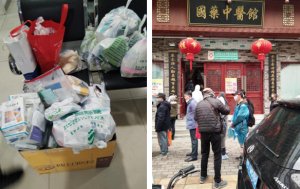今天是2020年2月21日星期五 第七篇
早上有零星小雨,中午時天空放晴。陽光下站久了感覺很是燥熱。
今天小區管控依舊,沒大的變化。我及另一位同事還有兩位年輕的志願者一大早乘社區的的士,到黃石路大藥房給重症患者居民買藥。委托社區購藥的居民人數不斷增加,病曆資料把的士的後備箱裝得滿滿的。
社區給居民購藥的規定是政府下達的,但各個社區的執行力度並不相同。我們把大包小包的資料搬下車時引來不小的驚歎之聲,給藥店增添了不小的壓力。現場仍然人滿為患。顯然各社區對這個規定的理解也不一致,有的社區只是開個證明讓居民自行到藥店購藥,而藥店依照規定只接待社區單位,一時間各種質疑乃至謾罵聲不絕於耳。一位七十多歳的老頭訴說,一星期前藥就沒了,來了三次都沒弄到藥,幹脆死了算了。那些維持秩序的保安們七吼八叫胡亂指揮,把現場弄得亂糟糟的。
這家藥店購藥流程跟到醫院看病差不多,首先要辦理所謂相關聯結的手續如同醫院掛號一般,然後要在櫃臺開處方,然後劃價,結算繳款,最後才能取到藥品。與我以前的經驗一樣,我們從早上領號排隊,到下午5時許才得以進入藥房。抱著小山一樣的資料,再面對如此麻煩的手續真有心亂如麻的感覺,而當我們好不容易弄清楚這些規程,開始辦理時又發現很多資料並不齊全。有的居民沒有提供醫保卡密碼,有的錢給的不夠,有的只有一個身份證連醫保卡也沒有。早上社區將所有資料一股腦地交給我們,說這事簡單,沒啥難度。總之,我們四個人手忙腳亂,一直忙到藥店下班也才辦理了一半。明天還得去。我就覺得這個事真的是笨拙的要命,但是回想這段時期,從我們遭受病毒襲擊到現在,那一次又不是這個樣子。一道道通告指令那一次不是令人手足無措,朝令夕改成了通病。直到現在填寫各種表格依然是各社區最核心的工作,接送病人的事永遠要拖到夜間進行,好像只有在夜間才是安全的。出這麼大的事,不能說領導們不辛苦,但領導們多數時間都在大大小小的會議上拼搏。在紛至遝來的指令下,暈頭轉向的社區疲於奔命。
當然,總體來看,現在整個防疫工作總算有了一定的模樣,逐漸步入軌道,但各種矛盾也日益突出。城市是什麼,城市生活是什麼,很多身居這座城池的人們好像並沒有真正理解。如果把防疫僅僅理解為封閉隔離,那危機四伏也必在情理之中。這並非聳人聽聞,生活在城市,柴米油鹽、水電、燃氣等等缺少一樣都會死人。堤與蟻穴的關系誰都清楚,也常常被一些人掛在嘴邊,但在現實中視而不見卻是人們慣常的德性。
出小區時看見有商販將一袋袋蔬菜放在小區出口旁邊,等待能夠出入小區的居民購買。上前一問,這樣的一袋竟要80元錢。也就是一些白菜、蘿蔔什麼的,這怎麼能夠保證老人孩子及病人們的營養。而且如此居高不下的物價之下,我們並沒有看到任何針對困難居民低保居民的進行補貼的政策和措施。有人調侃說,銀行都不營業了,就算發補貼那些人也沒處去領取。我本人在這短短的時間裏就已經開銷了一萬多元,其他更加困難的居民又都處於怎樣的境地。據我所知,很多人已經很長時間沒有吃肉,而其他如豆類食品同樣短缺,難於求購。
下班回家時,在小區出入口赫然看見路燈下站立著幾十個男女,彼此相隔近兩米距離,一動不動,不言不語,跟一根根排列整齊的木樁似的。我不禁問那守門人,這是怎麼呢?那家夥竟然面無表情地說,這不關你的事。這倒讓我緊張起來,空蕩蕩的小區,大晚上竟然出現這麼個情況,還真有些滲人。走了很遠遇上一個社區的熟人,才被告知這些都是來領取團購商品的居民,送貨的還沒到,他們就這樣一條線似的站著。其實到現在我還覺得很奇怪。畢竟都這麼晚了,一個個的還都站立的那麼筆直,那麼整齊,沒有任何表情,我甚至覺得他們的身高也都驚人的一致.........
 (為社區居民排隊購買藥物)
(為社區居民排隊購買藥物)FRIDAY, FEB. 21, 2020
There was scattered rain in the morning, and the sky cleared up by noon. However, it was too hot to stand in the sun for long.
Today, the monitoring of the apartment building remained the same, with no significant changes. Another colleague and I, along with two young volunteers, took a cab from a community service center early in the morning to the pharmacy on Huang Shi Lu Road to buy medication for residents with serious illnesses. As a result, the number of residents who entrusted the community service center to purchase medicine increased, and the cab was filled with medical records.
The government mandates that communities buy drugs for their residents, but the enforcement varies from community to community. There were many sighs of surprise as we carried the bags of medical records off the trunk, adding to the pressure on the pharmacy. The site was still overcrowded. It was clear that the different community service centers have different rules. Some communities just issued a certificate for residents to buy drugs from the pharmacy on their own, while the pharmacy only received community service centers according to the rules. There were many questions and even arguments. A 70-year-old man said that he had run out of medication a week ago and had come here three times without getting it. He said he would rather die. The security guards maintaining order were yelling and shouting, making a mess of the scene worse.
The process of buying drugs at this pharmacy is similar to going to the hospital. First, you must go through the so-called "linked procedure" as if you were registered at the hospital; then, you must submit a prescription at the counter, set the price, settle the payment and finally pick up the drugs. Like my previous experience, we queued up in the morning to get a number and could not enter the pharmacy until about 5:00 pm. It was a real mess to hold a mountain of information and face
such a troublesome procedure, and when we were able to figure out the process, we found that much of the information was not complete. For example, some residents did not provide their medical insurance card passwords, some did not give enough money, and some only had an ID card and no medical insurance card. In the morning, the community center handed over all the information, saying that it was not that simple and was difficult.
All in all, the four of us were busy and confused until the pharmacy was closed. Only half of the applications were processed. We still must go back tomorrow. The obstacles have been overwhelming, and it has become a common problem to change the orders overnight. To this day, filling out all kinds of forms is still the core work of the communities, and transporting patients is always delayed until the night as if it is only safe at night. With such a big event, we can't say that the leaders don't work hard, but they spend most of their time talking and talking in big and small meetings. The community service center is overwhelmed by the flood of orders that are coming in.
As a whole, pandemic prevention has now taken on a particular shape and is gradually getting on track, yet various conflicts are becoming increasingly prominent. Many people living in this city do not understand what the city is and what urban life is. If pandemic prevention is only remedied by isolation, it makes sense that there will be many crises. This is not fearmongering. Living in a city, people will die if there is a lack of food, oil, salt, water, electricity, and gas. The relationship between the dike and the anthill is clear to everyone. Some people often talk about it even though. in reality, people will turn a blind eye to their relationship. This is the popular "virtue" of people.
When I left the management center, I saw a trader put bags of vegetables next to the exit of the building complex. He was waiting for the residents, who could come out of the gate to buy stuff. I went up to ask for the cost. They told me that the bags cost 80 yuan. I thought to myself: "This is just some cabbage, radish; how can this provide nutrition
for the elderly, children, and the sick? And with such high prices, we don't see any policies and measures to subsidize low-income residents in need. Some people tease those banks are closed, so even if subsidies are given, there is no place for those people to get them. I have already spent more than $10,000 in this short time. What is the situation of other residents in greater difficulty? As far as I know, many people have not eaten meat for a long time, and other foods such as beans are also in short supply and hard to find."
When I came home from work, I saw dozens of men and women standing under the streetlights at the building gate. They were standing about two meters apart from each other, not moving, not saying a word, like a neatly arranged wooden pile. I could not help but ask the gatekeeper: "What is this?" The guy said rudely, "It's none of your business." That made me nervous. It was a bit of a shock to see such a situation in an empty neighborhood at night. After a long walk, I met an acquaintance from the community. He told me that residents had come to pick up their group purchases. The delivery man had not yet arrived, so they were standing in a line like this. I still find it very strange. After all, it's so late and they are all standing so straight, so neatly and quietly, I even think their heights were eerily similar.



